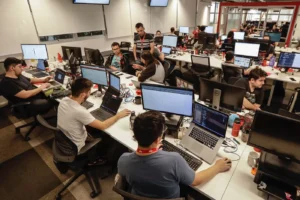Culture of making decisions based on data
applies from the operational to the strategic level
The more digitalization advances, the more a phrase that is becoming increasingly well-known makes sense: “data is the new oil”. The information that people and businesses share online (such as marking their location or making purchases online) are valuable inputs for decision-making in companies — and the core of data driven culture.
Data driven is an organizational culture in which operational and strategic decisions are based on evidence. “It’s about exchanging guesses for facts and adding the experience of professionals to this data”, explains Lucas Pedote, head and heart of data analysis at iFood — in addition to being the head, he is also the heart of data analysis.
This is because he believes that being data driven does not mean evaluating everything coldly, just looking at the data. “Experience, intuition and emotion are present in the process. The difference is that they are validated by data, so that our opinions, which are based on bias, do not distort reality”, he adds.
The biggest benefits of adopting this data-based approach are having greater clarity on the scope of opportunities that can be explored in the market and minimizing project risks, as they are supported by evidence.
“In the data driven culture, we take the hypothesis, do a test, validate this proposition with data and, if it makes sense, we scale it”, says Pedote. “When the company uses analytical thinking and brings data to validate these points, it spends less time and money.”
At iFood, the data driven culture passes through all areas of the company and works like this: the data engineering team captures and processes the information, which is evaluated by the data analysis team to be used in macro-level decisions (such as strategies business). Then, data science professionals and Artificial intelligence build algorithms capable of making micro-level decisions (like which restaurants to show you when you open the app).
https://news.ifood.com.br/foodtech/
All this to improve everyone’s experience with foodtech. “The data-driven culture is all about people, because its ultimate objective is to optimize human relationships: with our customers, delivery people, restaurants and society”, concludes Pedote.
In the e-book “Data analysis in business: a step by step towards a data driven culture in 2022” (download here), you learn more about the data driven culture, how iFood achieves its goals using data analysis and how you can do the same in your company.
To download the material, free of charge, simply access the link.
Know more:
5 data-driven Sales and Marketing trends
PR in the New Economy: how data-based communication is carried out
New Economy: what are digital platforms?


